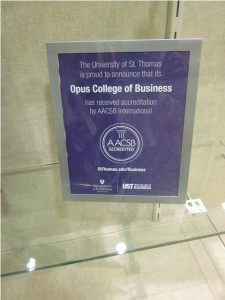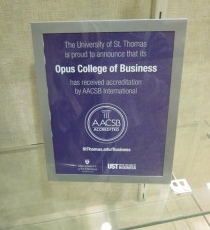Last year, St. Thomas welcomed its largest class ever with 1,612 freshmen marching through the arches during the first week of school.

Enrollment has seen steady increases over the past five years, and as the university continues to attract more students, there will be a need to hire more professors, add more classes and find more space for classrooms.
Sue Huber, executive vice president and chief academic officer, said certain departments have grown more than others because students believe they will find jobs in that area of study after graduation.
Huber cites the engineering department as an area of study that has seen an increase. In the past five years, the number of students graduating with engineering majors has increased from 36 students in 2007 to 64 students this year.
“The School of Engineering is doing extraordinarily well,” she said. “I think one of the reasons for the influx of students is the job market. Generally (the) job market tends to correlate very well with student interest in certain majors and certain departments.”
Other departments that have seen an increase or have remained steady are biological and biomedical science, communication and journalism, psychology and the Opus College of Business, which accounts for roughly 40 percent of the undergraduate population.
The university has taken measures to ensure students continue to receive a quality education despite its increasing size.
“Biology has had to hire professors, hire adjuncts, add classes, look for larger classrooms. You name it, they’ve done it,” Huber says. “The sciences are overflowing.”
Sophomore psychology major Leah Peterson said she chose her major mainly because of job availability.
“I’ve always been interested in psychology because I want to help people,” she said. “Even though I will have to eventually get my doctorate, people will always have a need for psychiatrists, so there will be jobs available.”
Huber also thinks the COJO department is benefiting from combining the departments and will continue to experience growth.
“We’ve hired a little in the COJO department,” she said. “In COJO you have a special niche. There is a job target there that makes people interested in pursing the major and interested because they know what they can do with it.”
Though several departments are experiencing growth, there are also a few that are struggling to attract students such as math, English, education and geography.
“English majors really are struggling,” Huber said. “Teachers of English can’t find jobs.”
Sophomore business major Krista Lamphere came to St. Thomas wanting to major in English but decided against it after realizing the lack of job opportunities.
“I decided to switch to business because the St. Thomas business school has a really good reputation,” she said. “I think I will have more luck finding a job after college with a business degree rather than an English degree.”
So how do St. Thomas students’ choices of majors compare to job availability in the current job market?
According to a study done by CareerBuilder using data from the National Association of Colleges and Employers, hiring by industry has increased in almost every sector with engineering, computer-related, and “money” degrees. Accounting and finance were found to have the most job openings. Additionally, liberal arts and science majors are also seeing more job opportunities than in the past.
Jessica Barton can be reached at bart2049@stthomas.edu.



